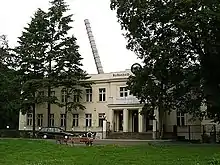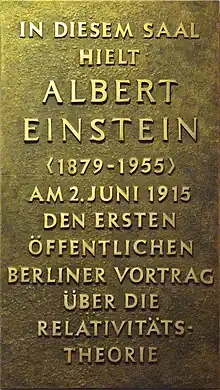Friedrich Simon Archenhold
Friedrich Simon Archenhold (2 October 1861 in Lichtenau, Kingdom of Prussia – 14 October 1939 in Berlin) was an astronomer who founded the Treptow Observatory (today the Archenhold Observatory) in Berlin-Treptow. He graduated from the Realgymnasium in Lippstadt before entering Friedrich Wilhelm University in 1882, where he and Wilhelm Förster founded the Urania Society at the Berlin University Observatory.[1]

Largest telescope
On the basis of Archenhold's plans, the world's longest moving refracting telescope was built with a focal length of 21 meters.[2] The telescope was part of the Great Industrial Exposition of Berlin, a world's fair.[3] The giant telescope was constructed in Treptow, a suburb of Berlin. The telescope was opened to the public on 1 May 1896 in a temporary wooden structure which was completed in September.
Public observatory

By 1908 Archenhold had raised the funds to replace the wooden structure with the building that stands today. Some of the funds came from admission fees to lectures but he also was able to secure funds from the Scottish American philanthropist Andrew Carnegie.

Archenhold was able to attract numerous well-known scientists and researchers for guest lectures at the Observatory. Perhaps the most famous was Albert Einstein who gave his first public lecture on the theory of relativity on 2 June 1915.
Like Wilhelm Foerster, Archenhold was interested in making scientific knowledge accessible to lay audiences. In addition to his support for the Urania Society, he was a member of various middle-class associations devoted to popularizing science.[4]
During 1920 Dr. Archenhold bought a fisherman's house with adobe walls and wooden cladding in the Baltic village of Bansin. When the long summer nights reduced his observation time F. S. Archenhold would take his family to his summer house in Bansin. Here he worked on the magazines and papers that he published at the observatory.
History of the Family
By 1938 the Nazi party confiscated the home from the family. His widow Alice Archenhold and daughter Hilde died at Theresienstadt.[5][6]
When the Russians defeated the Nazis the property was used by the community. The Observatory was named after Archenhold in 1946 as the Archenhold Sternwarte (Archenhold Observatory).
The Archenhold family had no right to recover any of the 125 acres of land or house until the fall of the Berlin Wall in 1989. His summer house on Seestraße, 63 is still standing, but it is in very poor condition. The old house in Bansin is now owned by the grand daughter of Dr. Archenhold.
After the reunification of Germany the Archenhold Observatory became part of the Deutsches Technikmuseum.
Archenhold is buried in Berlin's Friedrichsfelde Cemetery.
References
- Hockey, Thomas (2009). The Biographical Encyclopedia of Astronomers. Springer Publishing. ISBN 978-0-387-31022-0. Retrieved August 22, 2012.
- Herrmann, Dieter B. (1996). 100 Jahre Archenhold-Sternwarte die Geschichte der Archenhold-Sternwarte. Archenhold-Sternwarte (2., erg. Aufl ed.). Berlin. ISBN 978-3-89517-304-2. OCLC 75797393.
{{cite book}}: CS1 maint: location missing publisher (link) - Geppert, Alexander C. T. (2010), "Berlin 1896: Wilhelm II, Georg Simmel and the Berliner Gewerbeausstellung", Fleeting Cities, London: Palgrave Macmillan UK, pp. 16–61, doi:10.1057/9780230281837_2, ISBN 978-1-349-30721-0, retrieved 2021-12-19
- Andreas W. Daum, Wissenschaftspopularisierung im 19. Jahrhundert: Bürgerliche Kultur, naturwissenschaftliche Bildung und die deutsche Öffentlichkeit, 1848–1914. Munich: Oldenbourg, 1998, ISBN 3-486-56337-8, pp. 173–75, 181, 371, 385, 412, 473 (including a short biography).
- Konrad Jarausch; Matthias Middell; Annette Vogt (9 January 2013). Geschichte der Universität Unter den Linden 1810-2010: Sozialistisches Experiment und Erneuerung in der Demokratie - die Humboldt-Universität zu Berlin 1945-2010. De Gruyter. pp. 182–3. ISBN 978-3-05-006313-3.
- "Alice Archenhold | Database of victims | Holocaust". www.holocaust.cz. Retrieved 26 December 2018.